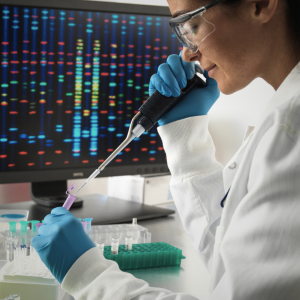Genetic Test of Sleep
The genetic test of sleep allows comparing of established daily rhythm with internal rhythm arising from genetic disposition (i.e. whether a person is more likely an evening type or a morning type) and its impact on cognitive and athletic performance, eating behaviour and metabolism.
€ 69.00
Description
Sleep DNA Test – Are You a Morning or Evening Person?
Each of us has an internal clock – a biological rhythm that determines when we feel most alert and when we need rest. The sleep DNA test helps you understand whether your typical daily routine aligns with your genetically determined internal rhythm — in other words, whether you are more of a morning or evening person — and how this affects your cognitive and physical performance, eating behavior, and metabolism.
Why does this matter?
Your ability to focus and perform at different times of day is governed by your chronotype, which has a significant genetic basis. When your internal biological clock is out of sync with your social or work schedule, your body is constantly forced to adapt — leading to sleep disturbances, fatigue, poor concentration, and increased vulnerability to overeating, alcohol use, weight gain, and mental health issues.
A key factor in regulating your sleep-wake cycle is the PER3 gene (Period Circadian Regulator 3), which affects sleep duration, depth, and circadian rhythm. The rs57875989 marker in this gene occurs in two forms: 4 or 5 tandem repeats (VNTR).
4/4 genotype: more commonly found in evening types, who often struggle with early wake-ups but feel alert later in the day.
4/5 genotype: indicates an intermediate chronotype, with flexibility to adapt to both early and late schedules.
5/5 genotype: typically found in morning types, who tend to wake up early and are most productive in the first half of the day.
These genetic variations are associated with overall sleep structure, daytime sleepiness, and an increased risk for Delayed Sleep Phase Syndrome (DSPS).
What does the test reveal?
Whether you are genetically a morning, evening, or intermediate chronotype
How sustained wakefulness affects Your reaction time and environmental awareness
Your genetic risk for Delayed Sleep Phase Syndrome (DSPS)
How Your chronotype impacts eating behavior and metabolism
The optimal time for peak athletic performance
Your sensitivity to external factors that affect mental well-being
How does the testing work?
Sample type: A DNA sample collected from the inside of your cheek using a swab
Processing time: Up to 15 business days
Sampling kit: Delivered conveniently to the address provided in your order
Who is this test for?
The test is suitable for people who want to better understand their well-being in order to improve their health. It’s especially useful for those who:
Feel out of sync with the standard work or social schedules and wish to change their schedule
Experience chronic fatigue, poor concentration, or sleep issues
Want to optimize daily routines or training schedules in alignment with their genetic profile










